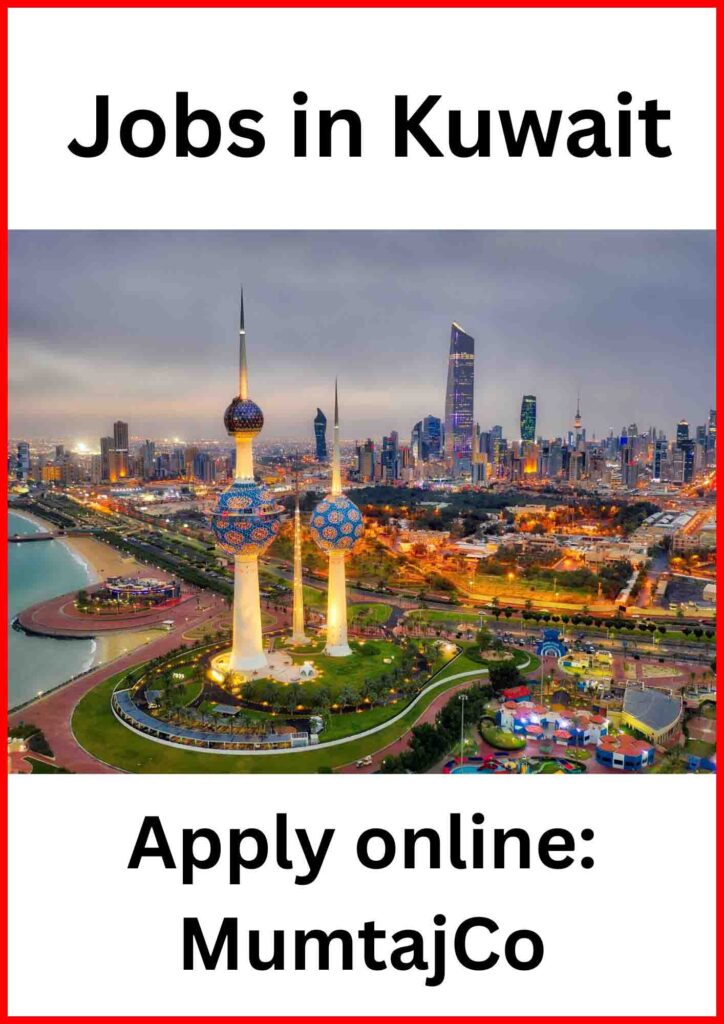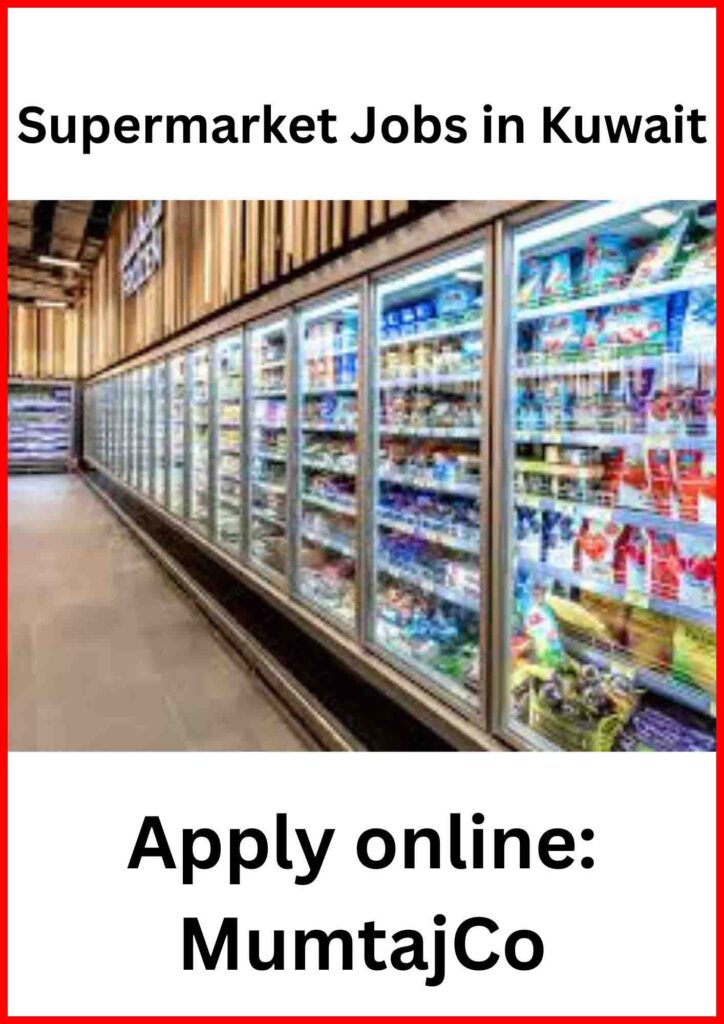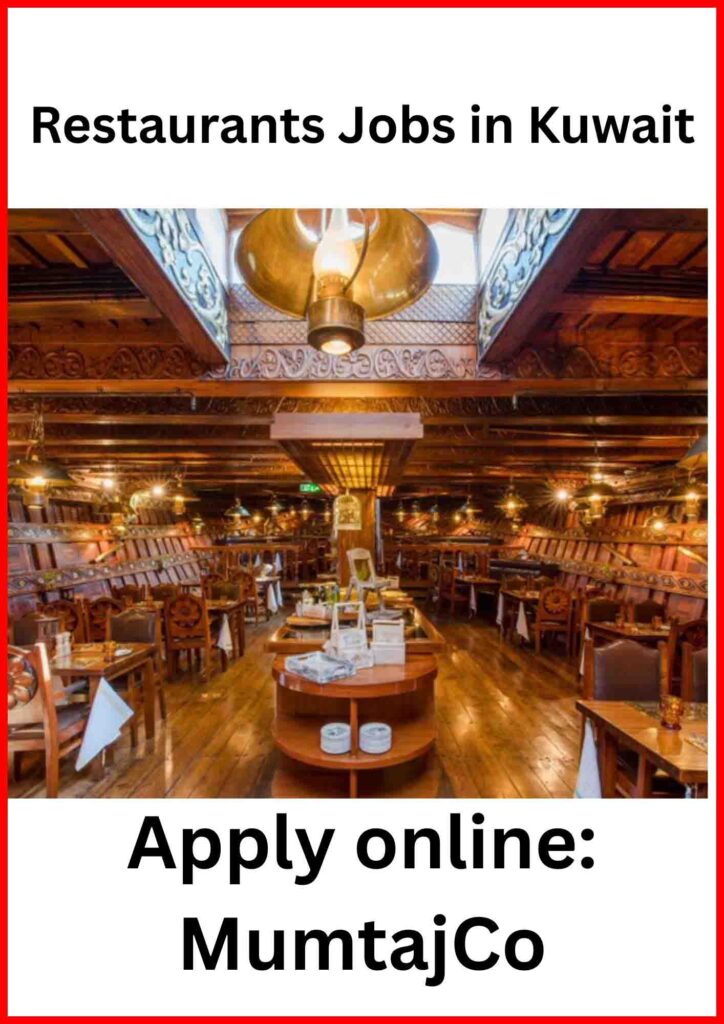Kuwait High Demand Jobs (2025) – Needed Skills, Salaries & Prospects
Hoping to create a great career in Kuwait? Search for the most in-demand positions in Kuwait for 2025 in expanding industries including healthcare, engineering, finance, IT, education, and hospitality. Driven by Kuwait’s Vision 2035, economic diversification is driving the nation to aggressively provide opportunities for qualified people both domestically and abroad. Focussing on the best professional sectors with growing career opportunities, fair compensation, and strong employer demand, this all-encompassing resource
Consider positions like digital marketers, civil engineers, financial analysts, cybersecurity specialists, doctors, nurses, software developers, and others. For every job, average monthly pay in Kuwaiti Dinars (KWD), and the leading firms are recruiting, identify the necessary abilities and technical knowledge. Kuwait’s dynamic labor market provides a great variety of career options in accordance with worldwide employment trends whether you are a new graduate, mid-level professional, or seasoned expert.
Kuwait’s healthcare industry is expanding in hiring, particularly for doctors and nurses. Digital change is pushing the IT industry to show more need for software developers and cybersecurity experts. Infrastructure initiatives are creating employment in civil and renewable energy engineering at the same time. Hotels and schools using local and foreign talent are also helping education and tourism to grow.
Knowing the most sought-after occupations in Kuwait will help you stay ahead in the crowded employment market. Whether you are presently employed in the Gulf region or intending to move, this book is your one-stop resource for negotiating Kuwait’s employment market in 2025 and beyond.
1. Reasons Healthcare Workers Ask For
An expanding population and the expansion of government and private hospitals have fueled a rising need for doctors, nurses, lab technicians, and chemists.
Top Job Positions:
- General doctors
- Surgeons and medical professionals
- Registered nurses
- Chemists,
- X-ray technologists
- Physio therapists
Required Credentials:
- Medical certifications and licenses; MOH license required
- Clinical expertise
- Empathy and ability to express
- Knowledge of patient data management systems
Average Monthly Salary:
- Doctors: KWD 2,000–4,500
- KWD 600 to KWD 1,200 for registered nurses
- Pharmacists: KWD 800–1,500
2. IT and Cybersecurity Professionals
Digitalization of services, growth of fintech, and rising cyber threats have made IT and cybersecurity roles extremely attractive and crucial.
Best Job Positions:
- Cybersecurity analysts
- Software developers
- IT project managers
- Cloud architects
- Data analysts
Required Skills:
- Programming (Python, Java, C++)
- Network security
- Penetration testing and ethical hacking
- Knowledge of tools such as AWS and Azure
- CompTIA, CEH, CISSP certifications
Average Monthly Salary: - Cybersecurity professionals: KWD 1,200–4,000
- Software developers: KWD 1,000 to 2,500
- IT help: KWD 500–1,200
3. Wanted by civil engineers and construction managers, drivers
Kuwait Vision 2035 is still stressing infrastructure growth. Urban planning, real estate, and public sector megaprojects are shaped by civil engineers.
Top Job Positions:
- Civil engineers
- Project supervisors
- On-site engineers
- Surveyor
- Structural architects
Needed Abilities:
- AutoCAD, Revit, SAP2000 expertise
- Understanding of safety standards and civil codes
- Management of time and spending
- Quality control and risk assessment
Average Monthly Salary: - Civil engineers: KWD 800–1,500
- KWD 1,500–3,000 for project managers
4. Banking Experts and Financial Analysts
Banking and investment changes increase the need for financial analysts, auditors, risk officers, and investment strategists.
Top Job Positions:
- Financial analysts
- Investment counsellors
- Auditors and accountants
- Risk controllers
- Tax advisors
- Needed Abilities:
- Excel and financial modelling
- International Financial Reporting System
- Forecasting and budgeting
- Skills in communication and bargaining
Average Monthly Salary:
Financial analysts: KWD 1,200 – 2,000
KWD 1,500 to 3,500 for investment advisers.
5. Professionals in digital marketing and e-commerce
Digital growth is being given top attention by online retail, hospitality, and entertainment industries; thus, SEO, sponsored ads, and content strategy are very vital.
Top Job Positions:
- Digital marketing experts
- SEM and SEO specialists
- Creators of content
- Managers of social media
- Online store managers
Needed Abilities:
- Google Analytics and SEO/SEM
- Email marketing and content writing
- Campaign management
- Creative Suite by Adobe
Average Monthly Salary:
- Digital marketers: KWD 800 to 1,500
- SEO professionals: KWD 600–1,200
- E-commerce directors: KWD 1,000–2,000
6. Engineers in mechanical, electrical, and renewable energy. Engineers with green energy expertise are growingly prized.
Main Job Positions:
- Electrical engineers
- Engineers of renewable energy
- Engineers in maintenance
- Energy inspectors
Needed Abilities:
- Electrical load study
- Design of renewable systems
- Knowledge of wind turbines, PV systems
- Regulatory compliance, such as LEED certification
Average Monthly Salary:
- Electrical engineers: KWD 1,200 – 2,500
- Engineers in renewable energy: KWD 1,500–3,000
7. Academic professionals and instructors look for drivers: Public and private schools in Kuwait are hiring qualified teachers due to a lack of language and STEM education.
Main Job Positions:
- Math’s and English teachers
- Teachers of science
- University professors
- Learning advisors
- Needed Credentials:
- Bachelor’s degree in education or subject area
- Teaching licenses (PGCE, TESOL, etc.)
- Classroom and behavior management
- Bilingual education is beneficial
Monthly Average Salary:
- KWD 700–1800 for school instructors
- KWD 1,500 to 3,000 for lecturers
8. Market Trends for Professionals Working in the Hospitality and Tourism Industry
There has been a resurgence in the luxury hotel and restaurant industries in Kuwait, as well as a revival in the events and tourism sector.
Top Job Positions:
- Hotel managers
- Event organizers
- Concierge and receptionist staff
- Kitchen personnel and chefs
Needed Abilities:
- Outstanding customer service
- Certificates in hospitality
- Inventory control and menu planning
- Software for reservations (Opera, POS)
Average Monthly Salary:
- Hotel managers: KWD 1,000– 2,500
- Cooks: KWD 700–1,400
9. Legal Advisors and Compliance Specialists
Legal advising in commercial, labor, and intellectual property sectors is being driven by foreign investments and regulatory changes, hence raising demand drivers.
Top Job Positions:
- Legal advisors
- Corporate lawyers
- compliance officers
- Agencies under contract
Required Qualifications:
- LLB or JD.
- Knowledge of laws in the GCC, Kuwait, and UAE.
- Negotiating, draughting, and legal research
- Fluent in both Arabic and English
Average Monthly Salary:
- Legal advisors: KWD 2,000–4,000
- Compliance officers: KWD 1,500 to 3,000
- 10. Experts in logistics, supply chains, and procurement
Increased imports, exports, and warehousing developments have helped Kuwait to grow as a regional logistics hub.
Best Job Positions:
- Supply chain managers
- Purchasing agents
- Supervisors of warehouses
- Coordinators of goods and logistics
Needed Abilities:
- ERP software (SAP, Oracle)
- Managing inventory
- Negotiation and forecasting
- Laws governing international logistics
Average Monthly Salary:
- KWD 1,000– 2,000 for logistics managers
- KWD 900 to KWD 1,800 for procurement experts.
Best Banks in Dubai for Expats and Investors
A global financial and economic hub, Dubai provides tourists and investors several banking choices. Investors or expatriates relocating to or staying in Dubai must choose the appropriate bank if they wish to meet financial needs. The Dubai financial system offers simplicity, efficiency, and dependability for managing loans, investments, foreign currency transactions, and savings accounts creation.
Dubai’s complicated financial environment is governed by the Central Bank of the United Arab Emirates. Banks operating in Dubai offer a different range of services whether local, regional, or worldwide. The modern banking system, digital services, and customer-oriented culture of the city enable to manage funds for novices.
Typically, foreigners may quickly open a bank account in Dubai. A valid passport, an Emirates ID, a residency permit, and evidence of employment or income are all required. Those lacking visas from particular colleges could also use non-resident accounts. Many Dubai colleges provide both traditional and Islamic banking choices, so enabling individuals to base their decisions on their financial habits or beliefs. Islamic banks run by Sharia law give profit-sharing agreements first importance and restrict interest-based transactions.
Many expats appreciate mobile and online banking as these technologies allow them to manage their accounts from any location. Dubai’s banks have developed secure and user-friendly online portals to facilitate ordinary banking procedures including investment tracking, bill payment, and money transfers. Foreign customers could voice their needs as customer assistance is often run in English.
Conversely, investors often select companies offering comprehensive wealth management services. These consist of portfolio management, real estate finance, private banking, and investment guidance. Most of Dubai’s foreign banks serve wealthy individuals and companies. Apart from providing customised solutions, their professional relationship managers are well-versed in both local and foreign financial markets.
The tax-efficient status attracts many overseas investors in Dubai. Most banking products are free from personal income tax as they are designed to boost profitability under international rules. So, Dubai presents an interesting choice for long-term financial planning and portfolio diversification.
The banks in Dubai also place security first. The government of the United Arab Emirates has tight policies to safeguard consumer funds and prevent financial crimes. Financial companies utilise modern cybersecurity measures to protect consumer data and digital transactions. This guarantees safety for both personal and business banking.
Another benefit for expats and investors is the support of several currencies by many Dubai-based businesses. Open accounts in AED, GBP, EUR, and USD to facilitate overseas transactions and lower currency risk. International monetary transactions are safe and efficient thanks to the SWIFT network and strong correspondent banking links.
Banks in Dubai offer loans and credit to international people and investors. Among these are vehicle loans, personal loans, mortgages, and credit cards. Eligibility and interest rates are set by the bank’s lending policy, your income, and credit history. Though their organisational structures differ, Islamic banks have common purposes and provide Sharia-compliant goods including Ijara and Murabaha.
Choosing a bank in Dubai primarily hinges on customer service. Usually, large financial institutions offer 24-hour helplines, dedicated relationship managers, and multilingual support. Branches are scattered across shopping malls, residential neighbourhoods, and commercial centres. Many banks provide specific expat desks to assist immigrants open accounts and obtain extra services.
Digital innovation drives Dubai’s banking experience. Many banks now provide artificial intelligence-powered chatbots, smartphone applications, and electronic wallets to enhance online banking. Standard features include biometric authentication, contactless transactions, and fast notifications enhance the speed and security of banking.
The global interest has been aroused by the reputation and dependability of Dubai’s financial sector. The leading banks in the United Arab Emirates are often praised for their inventiveness, financial strength, and client contentment. Often praised in awards and global banking lists, these banks cater to millions of both domestic and foreign users.
Dubai’s regulatory sandboxes and free zones encourage innovation by letting banks and fintechs design and test innovative financial products. Investors wishing to participate in the rapidly growing fields of digital finance, fintech, and blockchain can benefit from this innovative environment.
One should also take into account Dubai’s banking cost. Though many banks provide free fundamental account services, international transfers, minimum balance criteria, and premium services could be charged. Looking at your options and considering the cost policies might assist you select a bank that meets your financial constraints.
Entering Dubai’s financial sector is rather simple. Many ATMs provide services in multiple languages. Many colleges provide extra service priority banking. Its characteristics are vacation incentives, more severe withdrawal limits, and customised financial counsel. This is quite enticing for expats seeking faster reaction times and improved services as well as foreign investors.
Dubaibanks also supports entrepreneurs and small company owners. Their corporate banking products include merchant accounts, trade finance, and small and medium-sized business loans. Creating a business account might occasionally call for a valid trade licence and business registration documents, despite withstanding efforts to expedite the procedure.
Including international standards into the domestic financial system guarantees that foreign businesses and investors receive services that match global norms. Dubai is recognised as a fair and open financial centre because of its strict application of anti-money laundering (AML) and know-your-customer (KYC) regulations.
All things considered, Dubai’s banking sector provides a variety of services intended to please expats and investors. Dubai’s banks are ideally positioned to fulfil the different needs of an international clientele by means of innovative technology, rigorous regulation, global linkage, and client-centric services. Following international standards, Dubai offers a safe, contemporary banking environment for both sophisticated investment portfolio management and simple savings account setup. For anybody wishing to create a safe future in one of the most vibrant cities, this is a wonderful opportunity.


